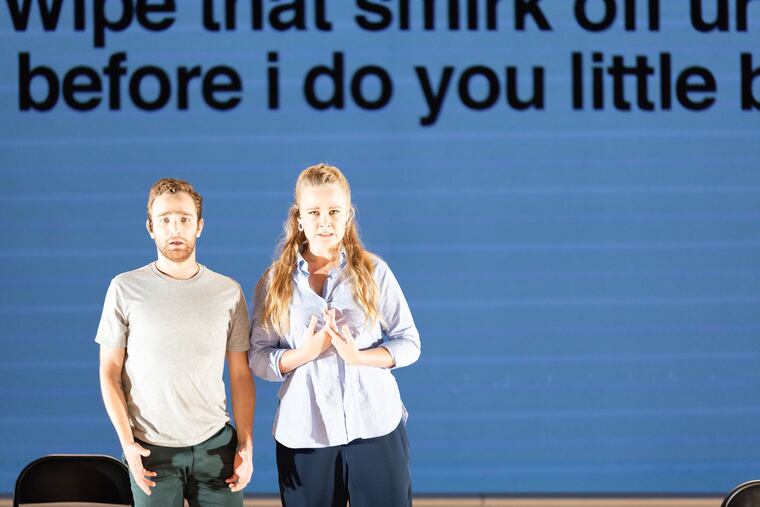Opera Philadelphia’s Festival O19 opens with game-changing world premiere of ‘Denis & Katya’
The work, by composer Philip Venables and director/librettist Ted Huffman, plays through Sept. 29 at the Suzanne Roberts Theatre.

Opera Philadelphia opened its Festival O19 Wednesday on a level that eclipsed the expectations created by the unusually high success rate of past festivals, this time with the world premiere of Denis & Katya. Highly experimental in its manner, the piece exudes great confidence of purpose plus gritty, thoughtful artistry — in the spirit of O19’s commitment to making opera a distinctly 21st-century thing.
The 80-minute, one-act opera arrived at the Suzanne Roberts Theatre less than three years after the real-life incident on which its based, when two Russian teenagers holed up in a small-town cabin with alcohol and ammunition, shooting at a police van, neighborhood dog, their own television, and one of their parents before dying ambiguously amid a police raid.
The twist is that they streamed their siege on video, giggling much of the time like the teenagers that they were, and inviting web commentary, trolls and all.
This quirky amalgamation of Romeo and Juliet, Bonnie and Clyde, and Sid and Nancy wasn’t conventionally dramatized. The story was told by outside observers — mainly a journalist and a best friend to the couple — and in a narrative style with the same words both sung and spoken, the former delivering the emotional content, the latter being cold, unadorned information.
Another layer came from messages that composer Philip Venables and librettist Ted Huffman (relative newcomers to mainstream opera) had sent back and forth to each other as they developed the work, ranging from businesslike observation to haunted empathy. These words were neither sung nor spoken but projected onto a screen, accompanied by computer beeps providing atmosphere and rhetorical emphasis.
The stage was virtually bare aside from four accompanying cellos at each of the corners. Yet the scenic and video design (by Andrew Lieberman and Pierre Martin, respectively) took charge when needed, including films of stark Russian landscape and abrupt, penetrating lighting effects amounting to a visual scream.
Nothing like this has previously come my way, except perhaps for 4.48 Psychosis, this team’s previous piece, which similarly uses words and percussion to portray fragile humanity who can’t stand to exist in the world as they experience it.
I came to Denis & Katya having read the libretto three times, seen 4.48 Psychosis twice, consulted YouTube for original footage of the real Denis Muravyov and Katia Vlasova, and listened to a podcast portraying Russian teenagers as having no hope of change under the eternal reign of Vladimir Putin.
That last part suggested how Muravyov and Vlasova went from well-mannered kids to reckless outlaws overnight: She is said to have been beaten by her stepfather, and with no real future, the two exercised an extreme freedom of options.
What was most on the minds of Venables, Huffman, and cocreator/dramaturge Ksenia Ravvina was how unreal the modern world has become for those who live in it via computer screens. The targets that the real-life Denis and Katya chose had turned into mere objects in their inebriated minds. They, in turn, became mere objects to authorities and to increasingly merciless commentators.
Much of the tension — and interest — came from the opera being at war with itself. Though words are presented in ways that couldn’t be more direct, the narrative was constantly splintered. Scenes were numerous, and sometimes lasting only a few seconds, jumping from one element to another. Momentum — and emotional engagement — was initially lacking.
Yet subtle progression was increasingly evident. The computer blips accompanying the projected words became higher in pitch. The brevity became frenetic and unpredictable. The cello writing, so spare at the beginning, grew increasingly inventive and interventionist.
In the final 15 minutes, Venables established himself as a true composer — as opposed to an effective dramatist — with levels of expressive depth written into highly singable vocal lines, rendered with eloquence by mezzo soprano Siena Licht Miller and especially by the warm, expressive baritone of Theo Hoffman.
In a way, Denis & Katya needs to be seen if only for the theatrical apparatus that it has invented. But it’s also a story worth telling and hearing in this anti-epic way: The teenagers Denis and Katya existed in a tiny, abbreviated world — that they never left alive.
OPERA REVIEW
Denis & Katya
Performances through Sept. 29 at the Suzanne Roberts Theatre, 480 S. Broad St., as part of Opera Philadelphia’s Festival 019.
Tickets: $40-$150
Information: 215-732-8400 or operaphila.org.